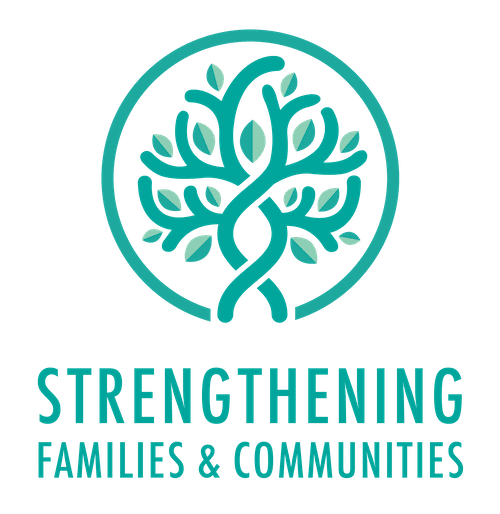FAMILY SUPPORT
Strengthening Families

Children grow and learn best in families with the support and skills needed to face difficult times that every family experiences. Strengthening Families is built around six protective factors which help families succeed. By building protective factors to cope with stressors, your family can thrive even in the face of challenges and adversity.
We believe that every child deserves the opportunity to hope, heal, grow.
As your regional Children’s Advocacy Center we partner with caregivers to build protective factors and cope with stressors so families are resilient and children thrive.
What Makes Families Strong?
Resilience – Families Bounce Back
We all experience challenges and difficult times. You can help your family by managing stress, problem solving, and taking care of yourself.
What does it look like?
- Families have strong problem solving skills
- Families are strong and flexible when it comes to stress
- Families recognize and value their strengths
- Families practice self-care
What Can I Do?
- Share your feelings with someone you trust
- Get physical exercise – walk, stretch, dance
- Enjoy quiet time – take a bath, read, write, play, drink a cup of tea or coffee
- Give yourself permission to ask for help if you need it
Relationship – Families Have People They Can Count On
Your family is not alone! Positive, healthy relationships with friends, family, co-workers and neighbors help your family feel connected and supported.
What does it look like?
- Families have multiple supportive friendships and relationships
- Families accept help from others and give help to others
- Families establish connections and a sense of belonging with other families
What Can I Do?
- Join neighborhood or school activites for families such as potlucks, fairs, or block parties
- Join playgroups or parenting groups
- Find a community group that supports parents
- Make time to give back
Knowledge – Families Learn How Their Children Grow & Develop
Caregivers don’t have all the answers, but we can work to understand what to expect as our children grow.
What does it look like?
- Families understand and know what to expect as their child develops
- Families practice positive techniques to guide their child’s behavior
- Families recognize when their child has specific development needs
What Can I Do?
- Join a Parent Cafe or parenting group to learn more about parenting and resources
- Explore parenting issues and try out new discipline strategies
- Find books and articles about parenting and child development at the library or online
Communication – Families Teach Children How to Have Healthy Relationships
We can teach our children how to manage and communicate their feelings and build healthy relationships.
What Does It Look Like?
- Families encourage their child to talk about, identify and express their emotions in a healthy way
- Families create an environment where their child feels safe to express their feelings
- Families help their child problem solve and set goals
What Can I Do?
- Provide regular routines and mealtimes, naps and bedtimes
- Teach your child words to express their feelings (sad, happy, mad, frustrated, confused)
- Show kindness and understanding
Support – Families Get Help to Meet Basic Needs
It can be challenging to focus on being a strong family while working to meet basic needs.
What Does It Look Like?
- Families have financial security to meet basic needs
- Families feel safe in their living environment
- Families feel supported and valued when reaching out for help
What Can I Do?
- Learn about health and social services in your community
- Make a list of people or places to call for support and services
- Join virtual community groups
- Build a small emergency fund
Nurturing & Attachment – Families Ensure Children Feel Loved & Safe
A nurturing family environment helps children feel safe, loved and supported. Quality time together is essential to healthy development and your child’s future.
What Does It Look Like?
- Families recognize and embrace their child’s strengths and individuality
- Families respond to their child with warmth and consistency
- Families teach their children how to maintain healthy relationships with others
What Can I Do?
- Be a good listener
- Connect with your child daily by smiling, hugging, listening, talking, reading
- Engage with your child while completing everyday tasks like preparing and eating meals, shopping and riding in the car
Parent Cafes
A parent cafe is a local event that supports families by inviting caregivers to come together in an informal setting and discuss topics related to parenting in our community. Cafes are free and open to all caregivers in the community.
Nurturing Parenting Program
Kentucky rated highest in the nation in reports of child abuse.
The Nurturing Parenting Program is a family-centered trauma-informed initiative designed to build nurturing parenting skills. The long term goals are to prevent recidivism in families receiving social services, lower the rate of multi-parent teenage pregnancies, reduce the rate of juvenile delinquency and alcohol abuse, and stop the intergenerational cycle of child abuse by teaching positive parenting behaviors. To learn more about Nurturing Parenting classes, please contact Bethany Vaughn at bvaughn@lotusky.org

